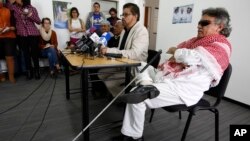Colombia's government can move laws needed to carry out the country's peace deal with the Marxist FARC rebels through Congress more quickly than usual, the Constitutional Court ruled Tuesday.
Both the Senate and the lower house backed the accord with the FARC, or Revolutionary Armed Forces of Colombia, in recent votes, giving necessary legislative approval to the deal to end 52 years of war that has killed more than 220,000 people and displaced millions.
But rebels have expressed worries about demobilizing while parts of the accord, including an amnesty law for most fighters, are still making their way through Congress. The government has said court backing for the quicker approval process, including fewer debates, will speed up passage of the laws, safeguarding a fragile cease-fire.
The court's 8-1 decision will cut the approval time to six months instead of a year, Senate President Mauricio Lizcano told journalists.
The coalition of President Juan Manuel Santos, who received the Nobel Peace Prize on Saturday, has a majority in Congress, where the peace-related laws are likely to pass easily. The right-wing opposition walked out of both houses in protest during the votes on the deal as a whole.
The agreement to end Latin America's longest insurgency came about a month after the original pact was defeated by less than 0.5 percent in an October referendum.
The amnesty law will exempt rebels not involved in war crimes or human rights violations from prosecution and will be the first of the peace laws the government will propose, officials have said.
Some 7,000 fighters from the FARC, which was founded in 1964 as a rebellion against rural poverty, are set to lay down their weapons under the deal.
Other laws tied to the pact pertain to rural reform, compensation for victims, removal of land mines and a U.N.-monitored cease-fire. The FARC will convert into a political party under the accord.





